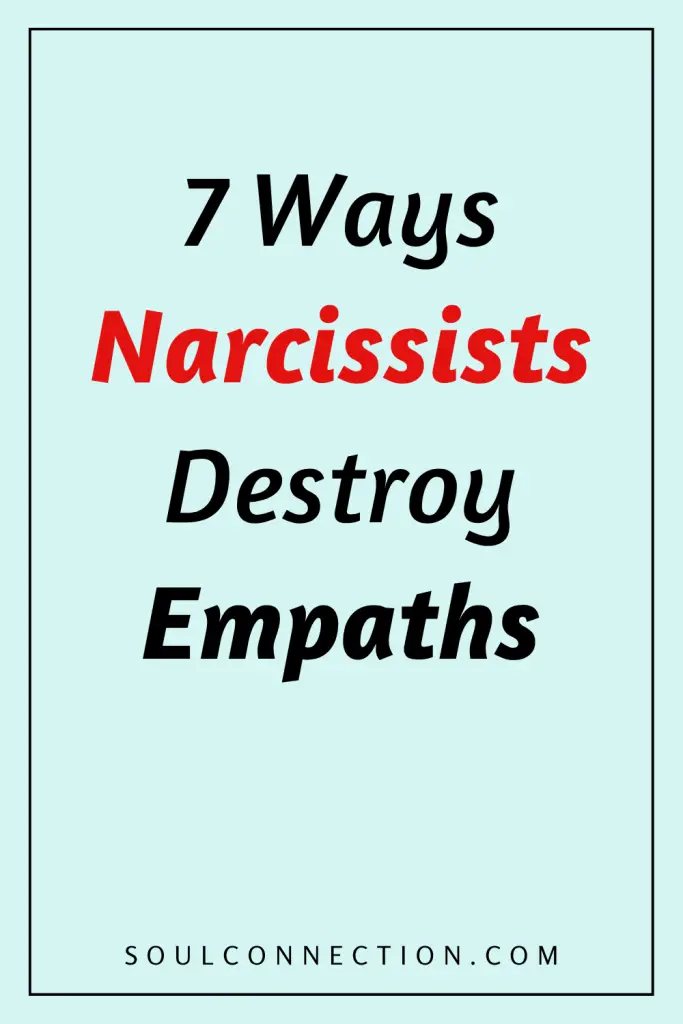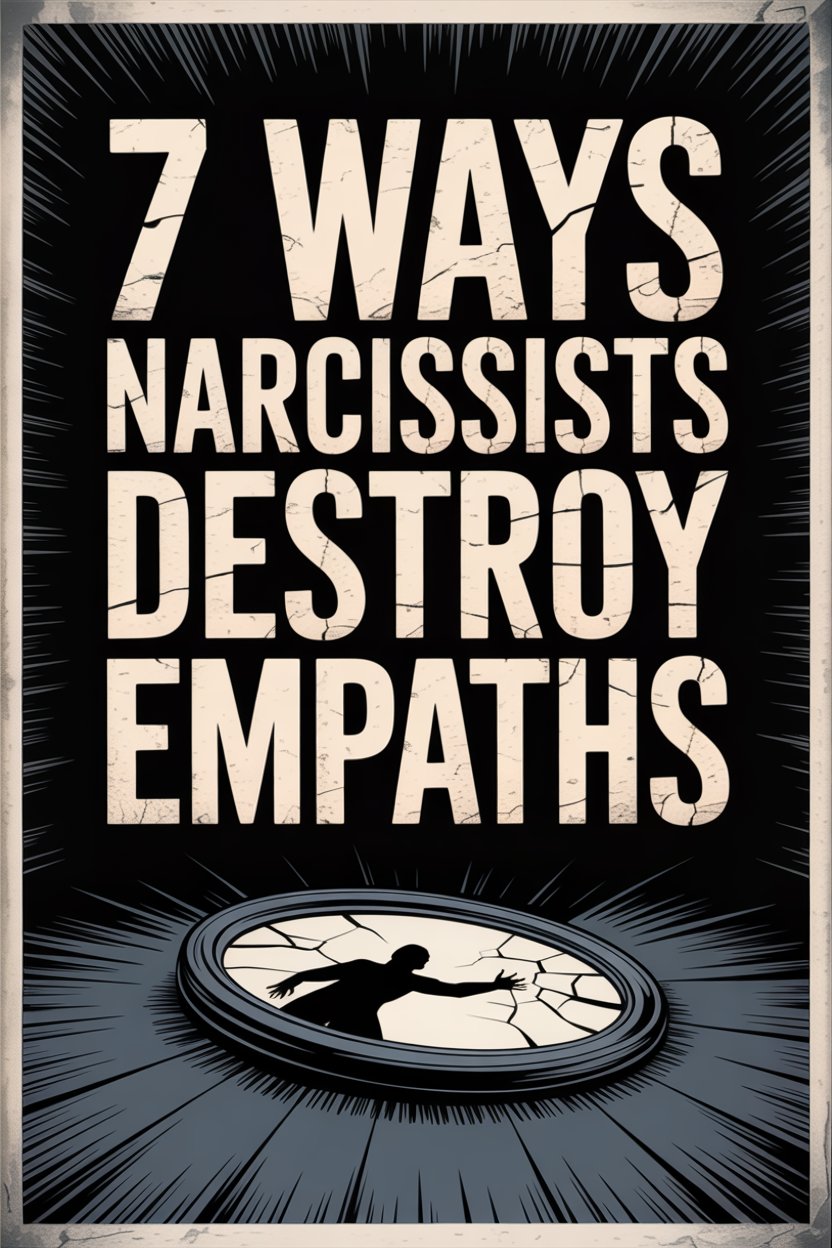Ever watched a horror movie where the sweet, animal-loving protagonist makes the fatal mistake of trusting the villain with a chainsaw and a winning smile?
Welcome to the classic narcissist-empath dynamic—a psychological thriller that, frankly, could use a lot less popcorn and a lot more therapy.
Empaths are emotional sponges with a sixth sense for feelings, wanting little more than for everyone to get along. Narcissists, on the other hand, are allergic to humility and thrive on attention the way teenagers thrive on Wi-Fi.
When these two cross paths, the outcome isn’t exactly rainbows and unicorns. Lucky for you, there’s no need to sit through the psychological carnage unprepared.
Here’s how narcissists dismantle empaths, piece by sensitive piece—plus some no-nonsense advice for fighting back.
1. Emotional Manipulation Becomes the Air You Breathe
Narcissists could win Olympic gold in emotional gymnastics. Empaths, meanwhile, have front-row seats—except the tickets are free and you can’t leave.
Guilt-tripping, gaslighting, and subtle digs become part of daily life, often wrapped in a shiny bow of “just joking.”
An empath’s natural urge to please morphs into perpetual confusion: Is it me? Did I do something wrong? Should I apologize for existing?
Here’s the unvarnished truth: if you’re feeling lost, double-check who’s holding the compass. Emotional manipulation works best when the empath doubts their own reality.
Keeping a journal or confiding in a trusted friend helps you spot the patterns and call them out. No, you’re not too sensitive. You’re just used to being around emotional stunt doubles.
2. Boundaries Are Bulldozed with a Smile
Empaths are generous—sometimes to a fault. Personal boundaries? Narcissists treat those like speed bumps on the way to what they want.
Requests for space or time alone get spun into accusations of neglect or selfishness. Before you know it, your calendar and emotions belong to someone else, and your needs sink to the bottom of Lake Guilt Trip.
Protecting your peace means actually enforcing those boundaries (yes, even when it makes you squirm). Start with small “no’s,” and work up to “Sorry, I can’t do that.”
If the narcissist treats your limits like a to-do list, you’re not required to offer explanations—just consistency.
3. Self-Worth Gets Shaken, Not Stirred
Empaths show up with unconditional support and a heart big enough for stray kittens and broken souls alike. Narcissists? They show up with criticism and a knack for exploiting insecurities.
Under constant attack—veiled or outright—your confidence starts to wobble. Compliments become rare; critiques flow like cheap wine at a wedding.
Suddenly, the empath’s sense of self is filtered through the narcissist’s funhouse mirror, leaving them questioning their worth.
Building a self-worth forcefield isn’t easy, but it’s vital. Make a list of what you value about yourself that has nothing to do with the narcissist’s opinion.
Channel your inner hype squad. Find your tribe, even if it’s just one or two ride-or-dies who remind you of what’s real.
4. Empathy Gets Weaponized
In the wrong hands, an empath’s gift for feeling deeply morphs into a powerful weapon. Narcissists are master tacticians in flipping the script.
They’ll twist your concern into something to be used against you. Your attempts at understanding become ammunition: “If you really cared, you’d do X for me.” Guilt becomes a leash.
Emotional labor becomes a full-time, unpaid job—complete with overtime and no benefits.
The secret is learning to differentiate between healthy support and emotional servitude. Ask yourself: Am I helping because I want to, or because I’m afraid of what will happen if I don’t?
The answer will tell you whether you’re being manipulated or just, you know, being a decent human.
5. Isolation Moves In, Unpacks, and Redecorates
Empaths crave connection, but narcissists prefer exclusive access. Friends, family, and even hobbies are subtly (or not-so-subtly) pushed out.
It starts innocently enough: a snide remark about a friend, a complaint about all your “me time.” Over time, the empath’s world shrinks until the narcissist is the only planet in the solar system.
Fewer outside perspectives mean less reality-checking—a terrifying prospect if you’re already doubting yourself.
Counteract isolation by maintaining your social ties, no matter how small. Even if it’s a quick text or a coffee date, outside contact is a lifeline.
If someone complains you’re “choosing others over them,” remind yourself that healthy relationships don’t come with solitary confinement.
6. The Empath’s Energy Becomes a Buffet
Narcissists are emotional vampires with bottomless stomachs. Empaths, for all their intuition, are often the all-you-can-eat special.
Constant drama, emotional outbursts, and crises drain the empath’s energy. With every new demand or tearful meltdown, the empath gives, thinking they’re being helpful—until, one day, there’s nothing left in the tank.
The narcissist, curiously, never seems to run out of appetite.
Reclaiming your energy means recognizing when you’re being used as a battery. Set limits on how much of yourself you give (and no, you don’t need to explain why).
Schedule “you time” as seriously as any other appointment. Newsflash: self-preservation isn’t selfish.
7. Healing Becomes a Moving Target
Empaths believe in growth. Narcissists believe they’re already perfect, thank you very much.
Attempts to address problems or pursue healing get derailed, mocked, or dismissed. “You’re overreacting,” “It’s all in your head,” or the classic, “You’re the problem, not me.”
Self-reflection becomes a solo journey, while the narcissist hands out gas cans for the emotional dumpster fire.
The only way to heal in this situation is to acknowledge that meaningful change requires participation from both sides.
If the narcissist won’t meet you halfway (or at all), it’s time to reroute your healing journey—preferably somewhere with less emotional shrapnel.
Rebuilding After the Storm
Emerging from the narcissist-empath rollercoaster can feel like crawling out of a tumble dryer full of emotional Legos. Bruised, perhaps, but definitely wiser.
Healing starts with recognizing the patterns, giving yourself permission to put your needs first, and rebuilding boundaries one brick at a time.
Therapy, support groups, and honest conversations with friends who have zero filters can be game changers.
Empaths have a rare gift for feeling—don’t let anyone convince you otherwise. Just remember that your intuition isn’t broken; it’s been hijacked.
Trust yourself to know when to hold on, when to let go, and when to run for the hills.
Because, as much as we wish otherwise, you can’t fix someone who thinks they’re flawless. But you can absolutely choose yourself, every single day.
And that, in itself, is a superpower worth holding onto.


